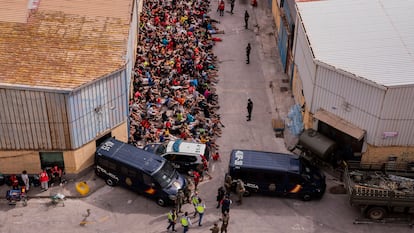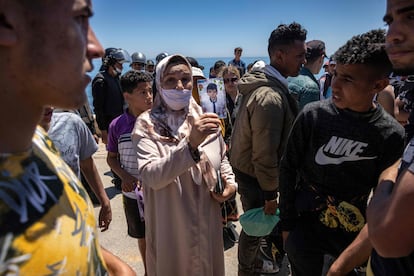Diplomatic pressure curbs Spain’s migrant crisis in Ceuta, but hundreds of minors remain in limbo
Morocco has resumed control of the border with the North African city after receiving public and private calls from the EU and foreign ministries across Europe

Morocco appeared on Thursday to have succumbed to pressure from Spain and the European Union over the migrant crisis in the Spanish North African city of Ceuta. After allowing thousands of people to cross into the exclave city on foot or by sea, Moroccan authorities decided once again to impose control at the border, a move that dramatically reduced the number of arrivals. Given Morocco’s unpredictability, the Spanish government was unwilling today to say the crisis was over but the latest developments indicated that it had clearly subsided. The main problem remaining was how to deal with the minors who entered and continued to enter Ceuta. A total of 740 migrant teens and children have been recorded, but the final count could be as high as 1,000.
The worst diplomatic crisis to have hit the administration of Spanish Prime Minister Pedro Sánchez appeared close to being solved, unless Morocco decides to break the truce. The images of thousands of youngsters and children launching themselves into the sea to cross one of the world’s most fragile and unequal borders made the front pages of many international newspapers and sparked heated clashes in Congress yesterday between Sánchez and opposition leader Pablo Casado, of the conservative Popular Party (PP).
But while Spain’s political parties locked horns in public, in private, diplomatic pressure on Morocco was growing, and the result of this began to be seen on Wednesday. Although there were more arrivals by sea, the situation was more controlled. The migrants arrived sporadically and took a longer sea route to avoid the Moroccan gendarmerie, which finally received the order to control the border as it had been doing without any difficulty until the crisis began on Monday.
A total of 5,600 migrants, many of them residents of areas neighboring Ceuta, had already returned to Morocco by Thursday. Some were deported by Spanish authorities, and others decided to voluntarily leave, after discovering there was no work, accommodation or opportunities for them there.
The Spanish government – a coalition of the Socialist Party (PSOE) and junior partner Unidas Podemos – went through various phases in how it approached the crisis. On Monday, when waves of migrants began to breach the border, the executive was not thinking about Ceuta, but rather Catalonia and the preliminary governing deal that had been struck between two separatist parties, the Catalan Republican Left (ERC) and Junts per Catalunya (Together for Catalonia). All the government’s statements were about this agreement, which was made three months after the Catalan regional election – a poll that was won by PSOE candidate Salvador Illa, but not by a large enough margin to secure an absolute majority.
It was not until Monday afternoon that news reached the prime minister that more than 1,000 migrants had crossed into Ceuta from Morocco. That sounded alarm bells, but the situation was to get a lot worse. Sánchez decided to take a tough line at a press conference, promising to protect Spain’s border “with all necessary measures,” and deployed the army to Ceuta to manage the crisis. But the key day was Tuesday when Sánchez and Foreign Affairs Minister Arancha González Laya made multiple calls and overtures to EU states in a bid to increase pressure on Morocco. The efforts worked. According to government sources, several European foreign offices made public and private calls to the Moroccan government to send the message that it was not only up against Spain but all of the EU.

The Spanish government is breathing more easily now after a tense day on Tuesday, which included Sánchez’s trip to Ceuta and the other North African exclave city of Melilla, where he was met with protests from dozens of local residents. But the executive does not trust Morocco, which has shown that it has no qualms when it comes to using its own people and allowing teenagers and children to risk their lives for the sake of a diplomatic offensive – in this case, to pressure Spain into recognizing Moroccan sovereignty over Western Sahara.
Western Sahara was previously occupied by Spain until 1975 when Morocco annexed the colony. The move triggered a war that year between the Moroccan government and the Popular Front for the Liberation of Saguia el-Hamra and Río de Oro (Polisario Front), which seeks self-determination for the Sahrawi people in the territory. In 1991, the Polisario Front and the Moroccan government agreed to a truce.
But in December last year, then-US president Donald Trump recognized Moroccan sovereignty over Western Sahara. This prompted Rabat to put unprecedented pressure on Spain and the EU to follow in Trump’s footsteps. Despite this pressure, González Laya has said that Spain is not going to change its position on the disputed territory.
Misstep by Morocco
Sources from the Spanish government believe that Morocco wanted to pressure Spain, but miscalculated and found itself up against the European Union, which is very concerned that the migrant crisis will help fuel the rise of the far right – parties such as the far-right Vox in Spain are already using images from Ceuta to spread xenophobia and win support.
It is key for the European Commission to mobilize, say government sources, because Morocco cannot fight against all of the EU, although it has shown it is willing to take on EU states, such as Germany – in May, the Moroccan government recalled its ambassador from Germany due to differences on the Western Sahara issue. Although the crisis is easing, Sánchez and González Laya continue to reach out to their contacts to guarantee it comes to an end. At a question-and-answer session in Congress on Wednesday, Sánchez described the issue as an “unprecedented crisis with Morocco” to criticize the PP’s lack of support. González Laya, meanwhile, tried to calm the tensions and maintained that Spain was “not going to enter an exercise to fuel the escalation” with Morocco.
The Spanish government also has no intention of rectifying its decision to admit Polisario Front leader Brahim Gali into the country for medical treatment for Covid-19. Morocco claims this is the cause of the diplomatic row with Spain, given that the Sahrawi liberation movement is outlawed in the parts of Western Sahara under Moroccan control. González Laya, who made the decision to accept the gravely ill 73-year-old, says it was a gesture of humanitarianism that was not meant “as an aggression against anyone.”
Spanish ministries insist that Morocco is a partner that Spain is “condemned to understand” and trust that normal diplomatic relations will be restored soon.

Express deportations
Many of the migrants who arrived in Ceuta this week have been deported or decided to return home voluntarily. The Spanish government was on Thursday confident that the crisis will be over soon, but it will still be left with a serious problem: what to do with the minors who crossed into the exclave city. The government has officially registered 740 minors, who are not subject to the same deportation agreements as adults, and will therefore be taken into state care. But there are many more youngsters on the street who have yet to be registered.
The government, in coordination with the Ceuta authorities, is urgently looking for a way to accommodate these youngsters. One possibility being considered is to set up military tents as shelter. It is estimated that 9,000 people managed to cross the jetties that separate Ceuta from Morocco, either by swimming or by foot, and of this number, between 2,000 and 3,000 were children and teens. The numbers are estimates given that it “was impossible to count” everyone given the scale of the arrivals, say security sources.
Indeed, no one knows how many minors are still in Ceuta. Dozens of them returned voluntarily, while others were expelled as “refusals at the border,” a euphemism for irregular expulsions or express deportations.
Spain’s Foreign Affairs Ministry is trying to establish a protocol with Morocco to allow unaccompanied migrants in Ceuta to contact their families if they want to return home, say government sources.
When the exact number of minors is clear, the government will begin to send them to different regions that have said they are willing to take them in. Regions governed by the PP with the support of Vox, such as Madrid, Andalusia and Murcia, are reluctant to help. Vox is demanding that not a single migrant minor be allowed in. Other regions governed by the PSOE and other parties have offered to collaborate. This is also the case in Galicia, which is run by the PP, but does not depend on Vox. Once the issue of the migrant minors is addressed, the crisis will be over, perhaps to the surprise of Morocco.
With reporting by news agency AP.
English version by Melissa Kitson.
Tu suscripción se está usando en otro dispositivo
¿Quieres añadir otro usuario a tu suscripción?
Si continúas leyendo en este dispositivo, no se podrá leer en el otro.
FlechaTu suscripción se está usando en otro dispositivo y solo puedes acceder a EL PAÍS desde un dispositivo a la vez.
Si quieres compartir tu cuenta, cambia tu suscripción a la modalidad Premium, así podrás añadir otro usuario. Cada uno accederá con su propia cuenta de email, lo que os permitirá personalizar vuestra experiencia en EL PAÍS.
¿Tienes una suscripción de empresa? Accede aquí para contratar más cuentas.
En el caso de no saber quién está usando tu cuenta, te recomendamos cambiar tu contraseña aquí.
Si decides continuar compartiendo tu cuenta, este mensaje se mostrará en tu dispositivo y en el de la otra persona que está usando tu cuenta de forma indefinida, afectando a tu experiencia de lectura. Puedes consultar aquí los términos y condiciones de la suscripción digital.








































